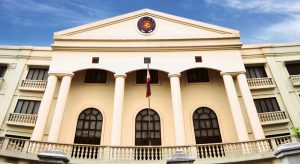By Aubrey Rose A. Inosante, Reporter
DEPARTMENT of Budget and Management (DBM) Secretary Amenah F. Pangandaman said a reenacted national budget for 2026 would hurt the economy and derail its transition to a higher income tier.
“A reenacted budget would set us back, delay our vital programs, and jeopardize our targets for economic growth, including our goals of achieving single-digit poverty levels, and upper middle-income status,” she told BusinessWorld via Viber on Tuesday.
The Philippines narrowly missed the World Bank’s threshold for reclassification as an upper middle-income economy.
Gross national income (GNI) per capita stood at $4,470 — just $26 short of the low end of the $4,496-$13,935 GNI range for the tier.
Apart from the risk to the budget, analysts are projecting a slowdown in gross domestic product (GDP) growth, citing global uncertainties like those posed by US tariffs.
In the first quarter, GDP grew by a weaker-than-expected 5.4%.
“Under a reenacted budget, our National Government agencies will be forced to operate using a budget that does not align with the programs and projects planned or proposed by the government agencies for 2025,” Ms. Pangandaman said.
President Ferdinand R. Marcos, Jr. warned legislators that he would not sign a General Appropriations Bill (GAB) that significantly departs from the National Expenditure Program, the document prepared by the Executive branch that serves as the basis for budget legislation.
If the GAB remain unsigned, the government automatically reenacts the previous year’s budget running in the same spending allocations, as prescribed by the constitution.
The 2025 spending plan is 6.87% lower than the proposed P6.793-trillion budget for 2026.
Finance Secretary Ralph G. Recto has said that a reenacted budget next year is unlikely, with Congress expected to fall in line after the President’s warning.
The last major reenacted budget crisis was in 2019 under President Rodrigo R. Duterte. After a standoff with Congress, the government operated under the P3.757-trillion national budget from 2018 until the 2019 budget bill was signed four months later.
The delay caused many projects to miss part of the dry season, which is prime weather for construction works. The building slowdown put a damper on government spending, which the economy depends on for much of its growth.
The reenacted budget resurfaced in 2020, though the standoff lasted less than a week, with Mr. Duterte signing the bill for the new year on Jan. 6.
Ms. Pangandaman also noted that a reenacted budget would hinder the creation of new government positions and block salary increases for public-sector employees, including teachers, nurses, and doctors in government hospitals.
“That’s a problem because it delays new projects, slows down disbursement, and hurts economic momentum,” Reyes Tacandong & Co. Senior Adviser Jonathan L. Ravelas said via Viber.
Public spending is a major driver of growth, rising 18.7% in the first three months this year, with the government frontloading much of its spending to skirt the spending ban that set in just before the May midterm elections.
“We’re talking about missed opportunities — especially for infrastructure, social programs, and climate resilience. It’s like trying to grow with last year’s shoes — too tight, not fit for today’s needs,” Mr. Ravelas said.
Ateneo Center for Economic Research and Development Director Ser Percival K. Peña-Reyes said a budget deadlock would not maximize the impact of government spending.
“The budget is best spent on things that generate the greatest benefit for the greatest number of people in the economy through the widest network of industry linkages,” he said.
He urged the government to allocate more funding to agriculture, health, and education, “with meaningful, long-lasting impact, and less on ayuda (cash aid for the poor), whose effects are merely transitory.”

